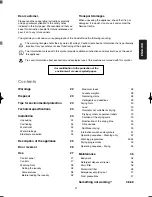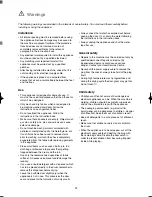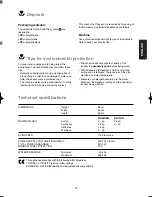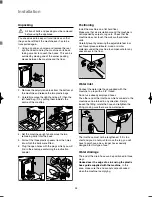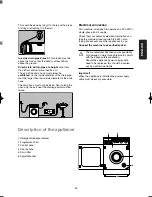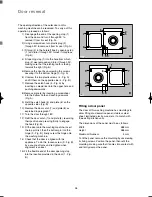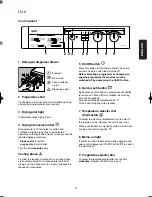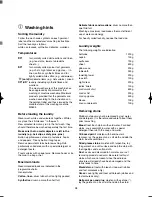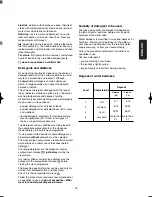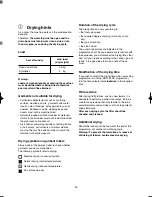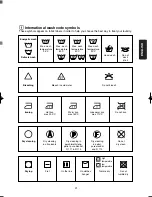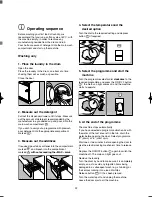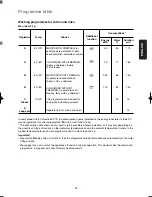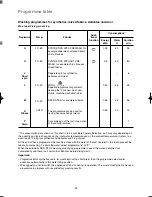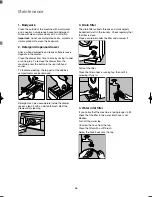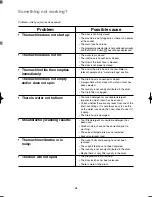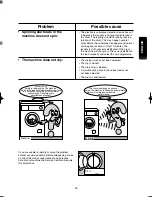
28
Washing hints
Sorting the laundry
Follow the wash code symbols on each garment
label and the manufacturer’s washing instructions.
Sort the laundry as follows:
whites, coloureds, synthetics, delicates, woollens.
Temperatures
90°
for normally soiled white cottons and linen
(e.g. tea cloths, towels, tablecloths,
sheets...)
60°
for normally soiled, colour fast garments
(e.g. shirts, night dresses, pyjamas....) in
linen, cotton or synthetic fibres and for
lightly soiled white cotton (e.g. underwear).
(cold)
for delicate items (e.g. net curtains), mixed
30°-40°
laundry including synthetic fibres and
woollens.
The wool wash cycle of this machine has
been approved by Woolmark for the
washing of machine washable Woolmark
products provided that the garments are
washed according to the instructions on
the garment label and those issued by the
manufacturer of this washing machine.
M9604.
Before loading the laundry
Never wash whites and coloureds together. Whites
may lose their “whiteness” in the wash.
New coloured items may run in the first wash; they
should therefore be washed separately the first time.
Make sure that no metal objects are left in the
laundry (e.g. hair clips, safety pins, pins).
Button up pillowcases, close zip fasteners, hooks
and poppers. Tie any belts or long tapes.
Remove persistent stains before washing. Rub
particularly soiled areas with a special detergent or
detergent paste.
Treat curtains with special care. Remove hooks or tie
them up in a bag or net.
Maximum loads
Recommended loads are indicated in the
programme charts.
General rules:
Cotton, linen
: drum full but not too tightly packed;
Synthetics
: drum no more than half full;
Delicate fabrics and woollens
: drum no more than
one third full.
Washing a maximum load makes the most efficient
use of water and energy.
For heavily soiled laundry, reduce the load size.
Laundry weights
The following weights are indicative:
bathrobe
1200 g
napkin
100 g
quilt cover
700 g
sheet
500 g
pillow case
200 g
tablecloth
250 g
towelling towel
200 g
tea cloth
100 g
night dress
200 g
ladies’ briefs
100 g
man’s work shirt
600 g
man’s shirt
200 g
man’s pyjamas
500 g
blouse
100 g
men’s underpants
100 g
Removing stains
Stubborn stains may not be removed by just water
and detergent. It is therefore advisable to treat them
prior to washing.
Blood
: treat fresh stains with cold water. For dried
stains, soak overnight in water with a special
detergent then rub in the soap and water.
Oil based paint
: moisten with benzine stain
remover, lay the garment on a soft cloth and dab the
stain; treat several times.
Dried grease stains
: moisten with turpentine, lay
the garment on a soft surface and dab the stain with
the fingertips and a cotton cloth.
Rust
: oxalic acid dissolved in hot water or a rust
removing product used cold. Be careful with rust
stains which are not recent since the cellulose
structure will already have been damaged and the
fabric tends to hole.
Mould stains
: treat with bleach, rinse well (whites
and fast coloureds only).
Grass
: soap lightly and treat with bleach (whites and
fast coloureds only).
Ball point pen and glue
: moisten with acetone (*),
lay the garment on a soft cloth and dab the stain.
132995220.qxd 12/17/01 4:19 PM Pagina 28 (Nero/Process Black pellicola)


